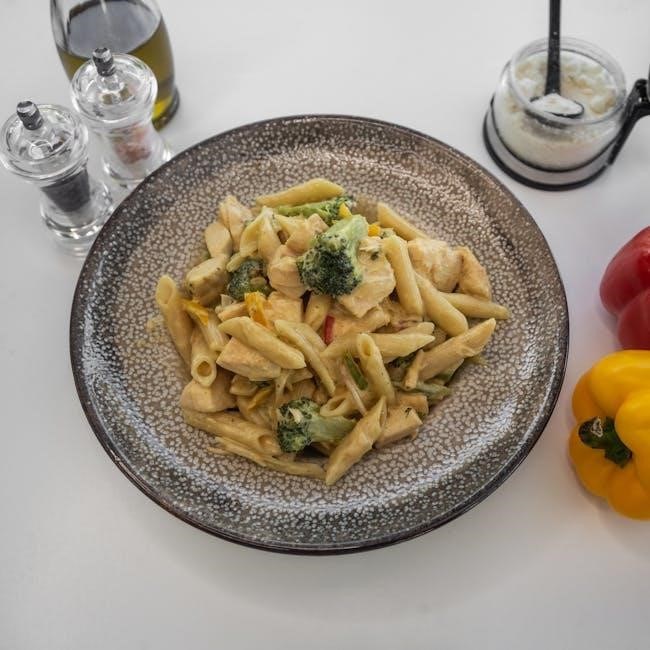
Overview of the Paddison Program
The Paddison Program is a comprehensive guide for managing Rheumatoid Arthritis, focusing on diet, exercise, supplements, and stress reduction. Developed by Clint Paddison, it offers a step-by-step approach to reducing symptoms and improving quality of life.

Diet Principles
The Paddison Program emphasizes a whole-food, plant-based diet free from salt, oil, and sugar. It promotes gut health and suggests B12 supplements for those adopting a vegan lifestyle to manage Rheumatoid Arthritis symptoms effectively.
2.1. Elimination Diet
The Paddison Program begins with a strict elimination diet, removing common inflammatory triggers like gluten, dairy, and processed foods. This phase lasts several weeks, allowing the body to heal and identify food sensitivities. Participants often report reduced inflammation and symptom relief during this period. The diet focuses on whole, unprocessed foods such as fruits, vegetables, legumes, and grains, which are easier to digest and support gut health. By eliminating potential irritants, the immune system is less likely to trigger autoimmune responses, which are central to Rheumatoid Arthritis. Clint Paddison emphasizes that this phase is crucial for calming the immune system and creating a foundation for long-term health. Many users have found this approach effective in managing their condition, though the initial transition can be challenging. The program provides detailed guidance to help participants navigate this phase successfully and gradually reintroduce foods to identify specific triggers.
2.2. Plant-Based Whole Foods
The Paddison Program strongly advocates for a plant-based whole food diet as the cornerstone of managing Rheumatoid Arthritis. This approach emphasizes consuming unprocessed, nutrient-dense foods such as fruits, vegetables, legumes, and whole grains. By focusing on these foods, participants reduce inflammation and promote healing in the body. The program encourages avoiding animal products, processed foods, and additives, which are often inflammatory triggers. The diet is not just a trend but is supported by scientific research, including studies published in the British Journal of Rheumatology, which highlight the benefits of a vegan diet in reducing autoimmune symptoms. Many users report significant improvements in joint pain and overall health after adopting this approach. The program also stresses the importance of avoiding salt, oil, and sugar, which can exacerbate inflammation. By adhering to this diet, individuals can create a foundation for long-term health and symptom management. The Paddison Program provides detailed meal plans and recipes to help participants transition to this lifestyle seamlessly;

2.3. Avoiding Salt, Oil, Sugar
The Paddison Program places a strong emphasis on eliminating salt, oil, and sugar from the diet to reduce inflammation and promote healing. These substances are known to exacerbate autoimmune conditions like Rheumatoid Arthritis by triggering inflammatory responses. Salt contributes to water retention and joint swelling, while oils, particularly processed ones, can disrupt gut health and increase inflammation. Sugar, on the other hand, is a major inflammatory agent that can worsen symptoms. The program encourages participants to avoid these substances entirely, providing guidance on how to identify hidden sources in common foods. By eliminating salt, oil, and sugar, individuals can significantly reduce inflammation and improve their overall well-being. The program offers practical tips for transitioning to a diet free of these substances, such as using herbs and spices for flavor and opting for natural, unprocessed foods. This approach is designed to create a healthier environment within the body, supporting long-term remission and symptom management.
2.4. Gut Health
Gut health is a cornerstone of the Paddison Program, as it plays a crucial role in managing Rheumatoid Arthritis. The program emphasizes that a healthy gut microbiome is essential for reducing inflammation and preventing autoimmune flare-ups. Clint Paddison advocates for a diet rich in whole, plant-based foods, which help promote the growth of beneficial gut bacteria. By avoiding processed foods, salt, oil, and sugar, participants can create an environment where their gut flora can thrive. The program also recommends specific foods like leafy greens, fermented vegetables, and certain legumes to support gut healing; Additionally, the elimination diet phase helps identify and remove foods that may be causing gut irritation. Improving gut health not only reduces joint pain and inflammation but also enhances overall immune function, making it easier to manage Rheumatoid Arthritis symptoms long-term. The Paddison Program provides detailed guidance on how to optimize gut health through dietary changes and lifestyle adjustments.
2.5. Meal Planning Tips
Meal planning is a vital component of the Paddison Program, ensuring adherence to its dietary principles. The program recommends preparing meals in advance to avoid deviations from the prescribed diet. Participants are encouraged to focus on whole, plant-based foods, excluding salt, oil, and sugar. Smoothies and salads are suggested as convenient options for busy days. Clint Paddison also advises incorporating a variety of colorful vegetables, legumes, and whole grains to ensure nutrient diversity. Meal prepping for the week can help maintain consistency and reduce the temptation to eat processed or inflammatory foods. Additionally, the program provides resources such as meal templates and recipes to simplify the planning process. By prioritizing gut-friendly foods and avoiding triggers, individuals can better manage Rheumatoid Arthritis symptoms. The program emphasizes the importance of gradual changes, allowing the body to adapt and heal. Over time, consistent meal planning becomes second nature, supporting long-term health and well-being.
Exercise and Movement
The Paddison Program emphasizes low-impact exercises like Bikram Yoga and daily movement to reduce inflammation and improve joint health. Consistency is key, with activities tailored to individual capabilities to promote healing and overall well-being.
3.1. Bikram Yoga
Bikram Yoga, a core component of the Paddison Program, involves a series of postures performed in a heated environment. This practice is believed to detoxify the body, improve circulation, and enhance flexibility. Many participants report reduced joint pain and inflammation, which are particularly beneficial for Rheumatoid Arthritis sufferers. The heat is thought to simulate the body’s natural healing processes, promoting the removal of toxins through sweating. Clint Paddison often highlights how Bikram Yoga helped him manage his own RA symptoms, making it a central recommendation in his program. Regular practice is encouraged to maintain progress and overall well-being. The combination of physical movement and the healing effects of heat creates a holistic approach to managing arthritis symptoms. Over time, many users of the Paddison Program have found Bikram Yoga to be an essential part of their journey toward symptom relief and improved quality of life. Consistency in practice is emphasized to achieve and sustain these benefits.
3.2. Daily Movement Tips
Daily movement is a key aspect of the Paddison Program, emphasizing gentle, consistent activity to support joint health and overall well-being. The program suggests starting with low-impact exercises like walking, swimming, or cycling to avoid putting excessive strain on joints. Incorporating stretching techniques and yoga can improve flexibility and reduce stiffness. It’s important to listen to your body and avoid overexertion, especially during flare-ups. Small, manageable sessions throughout the day are often more effective than intense workouts. Additionally, proper posture and mindful movement can help prevent unnecessary joint stress. The program encourages creating a routine that fits individual lifestyles, ensuring sustainability and adherence. Over time, regular movement can enhance strength, reduce inflammation, and improve mobility, making it a crucial complement to the dietary aspects of the Paddison Program. By prioritizing gentle and consistent activity, participants can better manage their Rheumatoid Arthritis symptoms and work towards long-term health benefits. This approach fosters a balanced and holistic path to healing and wellness.
3.3. Avoiding High-Impact Activities
Avoiding high-impact activities is a critical component of the Paddison Program, designed to protect joints from further stress and inflammation. High-impact exercises, such as running or jumping, can exacerbate Rheumatoid Arthritis symptoms and hinder recovery. Instead, the program recommends low-impact alternatives like swimming, cycling, or gentle walking, which promote mobility without putting excessive strain on the joints. Even activities like yoga or stretching should be modified to avoid overexertion or joint pain. Consistency is key, but it’s equally important to listen to your body and rest when needed. Over time, this approach helps reduce inflammation, preserve joint health, and improve overall well-being. By prioritizing gentle movement, participants can create a sustainable routine that supports long-term healing and reduces the risk of further joint damage. This mindful approach to physical activity is essential for managing Rheumatoid Arthritis effectively within the Paddison Program framework.
3.4. Importance of Consistency
Consistency is a cornerstone of the Paddison Program, emphasizing the need for regular and sustained effort in both diet and exercise. The program stresses that sporadic adherence or short-term commitment often leads to limited progress, as the body requires time to heal and adapt. By maintaining a daily routine that includes the recommended whole-food plant-based diet and low-impact exercises like Bikram yoga, participants can gradually reduce inflammation and improve joint health. Clint Paddison highlights that consistency allows the body to recover and rebuild, which is particularly crucial for those with autoimmune conditions. Over time, this steady approach fosters a healthier relationship with food and movement, leading to long-term symptom relief and improved quality of life. The program encourages setting realistic goals and celebrating small milestones to maintain motivation. Ultimately, consistency is key to achieving and sustaining the benefits of the Paddison Program for Rheumatoid Arthritis management.
3.5. Stretching Techniques
Stretching plays a vital role in the Paddison Program, complementing Bikram yoga and daily movement practices. Gentle, controlled stretches are recommended to improve flexibility, reduce stiffness, and enhance joint mobility without causing inflammation. The program emphasizes the importance of avoiding high-impact activities that may strain joints, instead focusing on low-intensity stretching to promote healing. Techniques such as shoulder rolls, neck stretches, and hip flexor stretches are often suggested to alleviate tension and improve range of motion. Consistency in stretching is key, as it helps maintain joint health and supports the body’s natural recovery process. The program also encourages participants to listen to their bodies, ensuring they do not overstretch or cause discomfort. By incorporating stretching into a daily routine, individuals can better manage Rheumatoid Arthritis symptoms and improve overall physical function. The Paddison Program’s approach to stretching is designed to be sustainable and adaptable, making it suitable for individuals at various stages of their health journey.

Supplements
The Paddison Program recommends essential supplements to support immune function and nutrient absorption. B12 supplements are crucial for those following a plant-based diet to prevent deficiency. Additional nutrients may include omega-3s and probiotics to support gut health and reduce inflammation.
4.1. B12 Supplements
B12 supplements are a critical component of the Paddison Program, particularly for individuals following a plant-based diet. Vitamin B12 is essential for nerve function, red blood cell production, and DNA synthesis; Since B12 is primarily found in animal products, those adhering to a vegan diet may develop deficiencies over time.
The program emphasizes the importance of regular B12 supplementation to prevent potential health complications. Clint Paddison recommends consulting with a healthcare provider to determine the appropriate dosage and form of B12, whether through injections, oral tablets, or sublingual forms. Proper supplementation ensures that participants can maintain optimal health while adhering to the program’s dietary guidelines.
By addressing B12 deficiency, the program aims to support overall well-being and complement the benefits of its plant-based, whole-food approach. This focus on supplementation underscores the program’s commitment to providing a balanced and sustainable solution for managing Rheumatoid Arthritis symptoms.
4.2. Other Nutrients
Beyond B12, the Paddison Program highlights the importance of other essential nutrients to support overall health and manage Rheumatoid Arthritis symptoms effectively. A plant-based, whole-food diet rich in fruits, vegetables, and legumes provides ample vitamins, minerals, and antioxidants. These nutrients play a crucial role in reducing inflammation and promoting healing.
The program emphasizes the elimination of harmful substances like gluten, nightshades, and processed foods, which can exacerbate inflammation. Instead, it focuses on incorporating nutrient-dense foods that support gut health and immune function; Fiber, for instance, is vital for maintaining a balanced gut microbiome, while antioxidants help combat oxidative stress.
By prioritizing whole, unprocessed foods, the Paddison Program ensures that participants receive a broad spectrum of nutrients tailored to their needs. This approach not only addresses nutritional gaps but also supports long-term well-being and symptom management. The program’s emphasis on diverse, whole foods makes it a holistic solution for those seeking to improve their health naturally.

Stress Management
Stress management is crucial in the Paddison Program, as chronic stress can exacerbate Rheumatoid Arthritis symptoms. Techniques like meditation and adequate sleep are emphasized to reduce inflammation and promote overall well-being.
5.1. Meditation
Meditation plays a key role in the Paddison Program, helping to reduce stress and inflammation. Regular practice can lower cortisol levels, improve emotional well-being, and enhance the body’s ability to heal. By incorporating mindfulness and deep breathing, individuals can better manage chronic pain and maintain a positive mindset, which is essential for overall health and symptom relief.
5.2. Sleep Importance
Sleep is a critical component of the Paddison Program, as it plays a vital role in healing and managing Rheumatoid Arthritis symptoms. During sleep, the body repairs tissues, regulates inflammation, and balances hormones, including cortisol, which impacts pain levels. Chronic sleep deprivation can exacerbate inflammation and worsen RA symptoms, making it essential to prioritize high-quality rest. The program recommends establishing a consistent sleep routine, creating a dark, quiet sleep environment, and avoiding screens before bedtime to improve sleep quality. Additionally, avoiding stimulants like caffeine in the afternoon can help promote deeper rest. By addressing sleep deficiencies, individuals can enhance their immune function, reduce pain sensitivity, and support overall well-being. Consistent sleep patterns are often cited by participants as a key factor in their progress within the program, alongside diet and stress management.
Success Stories
Natalie’s journey highlights the program’s effectiveness, as she successfully managed her RA without medication. Many participants report significant symptom reduction, improved energy, and enhanced quality of life by following the Paddison Program’s holistic approach.
6.1. Natalie’s Experience

Natalie, a determined individual, shares her inspiring journey with the Paddison Program. She struggled with Rheumatoid Arthritis symptoms for years but found life-changing relief after adopting the program’s diet and lifestyle principles. By eliminating harmful foods and embracing a whole-food, plant-based diet, Natalie significantly reduced her inflammation and regained control over her health. She emphasizes the importance of consistency and patience, as the initial transition was challenging but ultimately transformative. Natalie’s story serves as a testament to the program’s effectiveness, showcasing how adhering to its guidelines can lead to remarkable improvements in managing RA symptoms and achieving a better quality of life.
6.2. Other Testimonials
Beyond Natalie’s story, numerous individuals have shared their positive experiences with the Paddison Program. Many participants highlight the program’s structured approach to diet and lifestyle, which has helped them achieve significant reductions in Rheumatoid Arthritis symptoms. Carl, a Bio-Kineticist, emphasizes the importance of proper movement techniques, which he learned through the program, to manage joint health. Others have reported improved energy levels, reduced inflammation, and the ability to discontinue medications after adopting the program’s principles. A common theme among testimonials is the effectiveness of the elimination diet and the benefits of focusing on whole, plant-based foods. Several participants also credit the program’s emphasis on gut health and stress management for their progress. While results vary, many testimonials underscore the program’s potential to transform lives and provide hope for those seeking natural relief from Rheumatoid Arthritis symptoms. The collective experiences highlight the Paddison Program as a valuable resource for those willing to commit to its guidelines.
Troubleshooting
About 10% of participants do not experience significant relief during the initial 2-day cleanse phase. This may indicate the need for further adjustments, such as optimizing gut health or re-evaluating medical treatments.
7.1. Initial Cleanse Phase
The initial cleanse phase is designed to eliminate toxins and reduce inflammation quickly. Many participants find the first 12 days challenging, experiencing increased pain as the body detoxifies. However, gradual improvement often follows, with reduced symptoms over time. It’s crucial to stick strictly to the program during this period, as deviations can hinder progress. Some may need additional steps like gut health optimization or medical treatment adjustments. Patience and adherence are key for those who don’t see immediate results.
7.2. Non-Responders
About 10% of participants in the Paddison Program do not experience significant symptom relief during the initial phases. This can be due to various factors, such as underlying gut health issues or the severity of their condition. For non-responders, the program recommends additional troubleshooting steps, including optimizing gut health, reviewing supplement intake, and ensuring strict adherence to the diet. Some may need to explore further medical or alternative therapies. It’s important to consult with a healthcare provider to rule out other contributing factors. Patience and persistence are key, as improvements may take longer for certain individuals. The program emphasizes that everyone’s response is unique, and what works for one person may not work for another. By addressing potential gaps in the approach, non-responders can still achieve meaningful progress and symptom relief over time.




